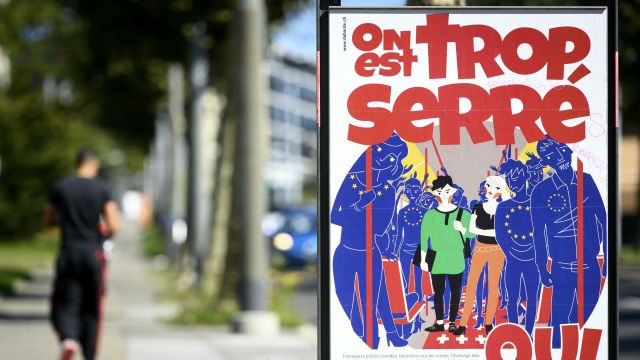Swiss public broadcaster SRF reported, based on a partial count, that the measure had been rejected by 61.3% of voters, with 38.7% in favour.
A large majority of the country’s 26 cantons, or states, also rejected the plan proposed by the Swiss People’s Party to give preferential access to jobs, social protection and benefits to people from Switzerland over those from the 27-nation bloc that surrounds it.

The government had warned that, if passed, the measure could have further strained the rich Alpine’s country’s deep and lucrative ties to the EU, of which it is not a member. It could also have led to reciprocal disadvantages for millions of Swiss citizens if they wanted to live or work in the EU.
Roughly 1.4 million EU citizens live in the country of about 8.6 million, while around 500,000 Swiss people live in EU countries.
In a similar referendum in 2014, the Swiss narrowly voted in favour of limiting access of EU citizens to live and work in Switzerland.
But politicians refused to fully implement the referendum fearing a hefty impact on Swiss society and businesses, prompting the People’s Party to get the issue back on the ballot again this year.
Since the last vote, Switzerland has witnessed the turmoil that Britain’s 2016 referendum to leave the European Union has caused, especially for EU citizens in the UK and Britons living on the continent.

Voter Yann Grote in Geneva said he did not approve of further limiting freedom of movement.
“I’m not at all in favour, and even more now, because it’s not a time to isolate Switzerland,” he said.
Fellow voter Elisabeth Lopes agreed, saying: “I’m a daughter of immigrants, so it is a matter that touches me.
“If Switzerland had to withdraw or reduce these agreements (with the EU), I think we would be the real losers.”
The freedom-of-movement measure was being considered alongside nationwide votes on several other issues.
SRF reported that a majority of voters backed a plan for paid paternity leave, while rejecting a measure that would increase tax breaks for childcare.
The outcome of votes on the purchase of billions of pounds worth of new fighter planes by 2030, and the right to hunt wolves to keep their population down remained too close to call.







